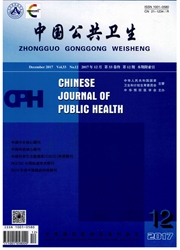

 中文摘要:
中文摘要:
目的 了解基本药物制度背景下慢性病患者用药依从性的影响因素。方法 利用Morisky患者用药依从性问卷测量1 200名慢性病患者用药依从性,并对数据进行单因素与多因素分析。结果 慢性病患者对基本药物制度知晓率为50.7%(608/1 200);63.8%(765/1 200)的慢性病患者用药依从性表现较好,城市患者用药依从性为64.3%(222/345),好于农村的63.5%(543/855),不发达地区患者用药依从性为66.1%(517/782),好于经济发达地区的59.3%(248/418),〈40岁人群患者用药依从性为71.6%(96/134),好于其他年龄组的62.8%(669/1 066);慢性病患者用药依从性的影响因素主要包括患者用药偏好、基层医疗机构的药物供应与用药指导等。结论 当前应在基本药物制度顶层设计优化、慢性病患者用药偏好矫正与基层医疗机构用药指导方面加大建设力度。
 英文摘要:
英文摘要:
Objective To explore influencing factors of medication compliance among chronic disease patients under the implementation of national essential medicine system.Methods A total of 1 200 chronic disease patients in Shandong province were recruited with stratified random sampling and surveyed with 8-Item Morisky Medication Adherence Scale.Univariate and multivariate analysis were used in data analyses.Results Among the participants,the awareness rate of national essential medicine system was 50.7% and the proportion of the participants with good medication compliance was 63.8%.The proportion of the urban participants with medication compliance was higher than that of the rural participants (64.3%[222/345]vs.63.5%[543/855]);compared to the participants in developed regions,the participants in undeveloped regions showed a higher proportion of medication compliance(66.1%[517/782]vs.59.3%[248/418]);the participants aged less than 40 years had a higher proportion of medication compliance than the participants at other ages (71.6%[96/134]vs.62.8%[669/1 066]).The influencing factors of medication compliance included participants'medication preference,medicine supply and medication guidance in grassroots medical institutions.Conclusion Top-level design optimization of national essential medicine system should be implemented and measures should be taken to adjust medication preference of chronic disease patients and to promote medication guidance in grassroots medical institutions.
 同期刊论文项目
同期刊论文项目
 同项目期刊论文
同项目期刊论文
 期刊信息
期刊信息
